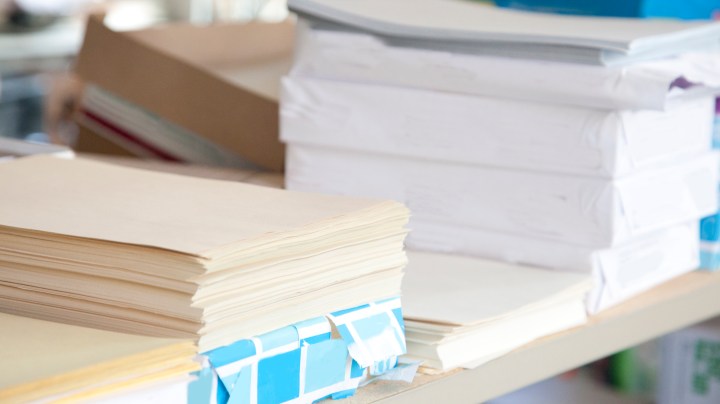
Will “deprinting” reduce the paper industry’s carbon footprint?
Will “deprinting” reduce the paper industry’s carbon footprint?

The pulp and paper industry is ranked as the fourth-biggest contributor to global warming among manufacturing sectors in the United States. That’s not just because it destroys a large number of trees that would otherwise be capturing huge amounts of carbon. The whole cycle of felling trees, transporting them and using coal- and gas-fired processes to turn them into pulp is highly polluting.
“Every single sheet of paper that we use has a global environmental impact,” observed Cecilia Alcoreza, manager of forest sector transformation for the World Wildlife Fund conservation group.
“And even at the end of its life cycle. If paper products end up in landfill, they produce a lot of CO2 emissions. Paper has a very big carbon footprint. And we’re still using a lot of paper. This is still one of the largest industries in the world.”
This will sound counterintuitive in the digital age. Aren’t we supposed to need less paper?
“Amazingly, demand for paper is still going up,” said Julian Allwood, a professor of engineering and the environment at the University of Cambridge. In an interview with the BBC, Allwood stated: “After 50 years of talking about the paperless office, we haven’t got there yet. We could change that by changing the amount of paper and packaging we’re all using.”
A new device, developed by an Israel-based entrepreneur, could help us do just that. In a Zoom call from his laboratory near Tel Aviv, Barak Yekutiely, co-founder of Reep Technologies, enthused about his laser “deprinter” — a machine that deletes the printed word.
“It removes, completely evaporates, ink from a sheet of paper without any damage,” he said.
The paper has been coated beforehand to ensure that the ink doesn’t sink too deeply into it, and once the laser has burned off the ink, the text simply disappears without a trace.
“This means the same sheet of paper can be used and reused again and again,” chipped in Barak’s wife and the company’s co-founder, Margalit Yekutiely. “We can reprint up to 10 times. Eventually, we might be able to reprint 20, 50 or even 100 times.”
Given the huge savings of paper, Barak said their so-called circular printing will be much cheaper than the conventional process. It can help save the planet too.
“Reep can achieve a 90% or more reduction in CO2 and the consumption of resources, such as biomass, water, chemicals, energy and, of course, trees,” he said.
The challenge would be keeping the same sheet of paper in good condition after it’s been reprinted and handled 10 times — let alone 50 or 100. But the Yekutielys, who are planning to launch a circular printing service for businesses and governments next year, expressed confidence that customers will adapt to the need to return the paper for reprinting in reasonable shape. They say deprinting represents a historic turning point.
“This is a breakthrough for the print and paper industries in that it creates a sustainable usage model for the first time since the invention of paper and printing,” Barak said.
While Reep is planning a printing service for now, it may one day get into the business of licensing its technology and aiming for the ultimate goal: a combined printer and deprinter small enough to sit next to any home or office computer.
That would really be a breakthrough — and a sign that the paper industry has turned the page on pollution.
There’s a lot happening in the world. Through it all, Marketplace is here for you.
You rely on Marketplace to break down the world’s events and tell you how it affects you in a fact-based, approachable way. We rely on your financial support to keep making that possible.
Your donation today powers the independent journalism that you rely on. For just $5/month, you can help sustain Marketplace so we can keep reporting on the things that matter to you.

















